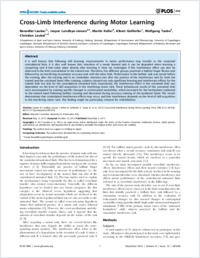Cross-limb interference during motor learning
- Lauber, Benedikt Department of Sport and Sport Science, University of Freiburg, Germany
- Lundbye-Jensen, Jesper Department of Neuroscience and Pharmacology, University of Copenhagen, Denmark
- Keller, Martin Department of Medicine, Movement and Sports Science, University of Fribourg, Switzerland
- Gollhofer, Albert Department of Sport and Sport Science, University of Freiburg, Germany
- Taube, Wolfgang Department of Medicine, Movement and Sports Science, University of Fribourg, Switzerland
- Leukel, Christian Department of Sport and Sport Science, University of Freiburg, Germany
-
03.12.2013
Published in:
- PLoS ONE. - 2013, vol. 8, no. 12, p. e81038
English
It is well known that following skill learning, improvements in motor performance may transfer to the untrained contralateral limb. It is also well known that retention of a newly learned task A can be degraded when learning a competing task B that takes place directly after learning A. Here we investigate if this interference effect can also be observed in the limb contralateral to the trained one. Therefore, five different groups practiced a ballistic finger flexion task followed by an interfering visuomotor accuracy task with the same limb. Performance in the ballistic task was tested before the training, after the training and in an immediate retention test after the practice of the interference task for both the trained and the untrained hand. After training, subjects showed not only significant learning and interference effects for the trained limb but also for the contralateral untrained limb. Importantly, the interference effect in the untrained limb was dependent on the level of skill acquisition in the interfering motor task. These behavioural results of the untrained limb were accompanied by training specific changes in corticospinal excitability, which increased for the hemisphere ipsilateral to the trained hand following ballistic training and decreased during accuracy training of the ipsilateral hand. The results demonstrate that contralateral interference effects may occur, and that interference depends on the level of skill acquisition in the interfering motor task. This finding might be particularly relevant for rehabilitation.
- Faculty
- Faculté des sciences et de médecine
- Department
- Département de Médecine
- Language
-
- English
- Classification
- Biological sciences
- License
-
License undefined
- Identifiers
-
- RERO DOC 209175
- DOI 10.1371/journal.pone.0081038
- Persistent URL
- https://folia.unifr.ch/unifr/documents/303342
Statistics
Document views: 134
File downloads:
- pdf: 135
